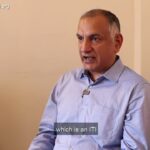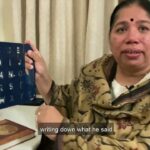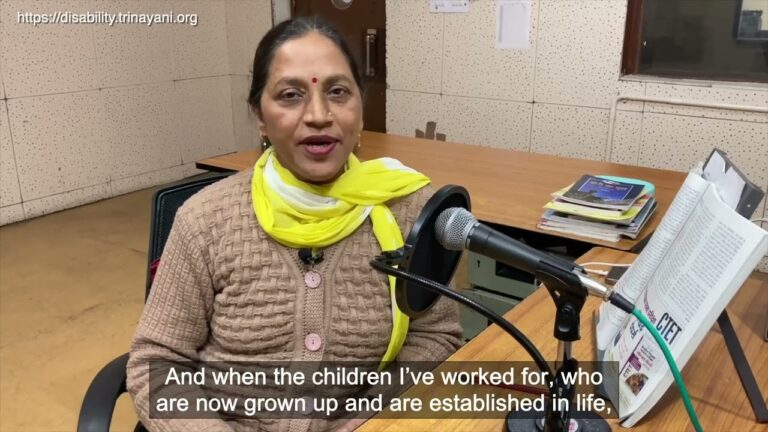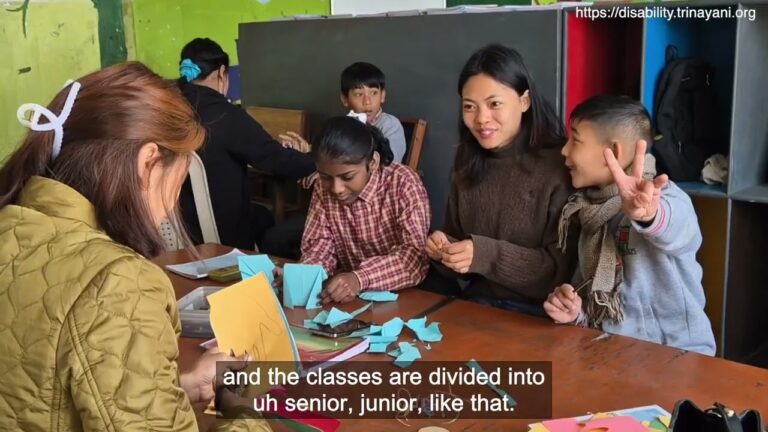Lessons in Love: A Journey in Parenting a Child with Down Syndrome
This film offers an intimate look into the life of Shivani Dhillon, a mother and caregiver whose daughter Shreya has Down Syndrome. The narrative celebrates the journey of growth and love experienced by Shivani and her family. Through her candid reflections, viewers are invited to witness the reality of raising a child with Down Syndrome: both the unanticipated joys and the everyday struggles that come with it. Shivani is all about embracing the uniqueness of each of her children!
This film also shines a light on the importance of the support systems that are built and the strength found in familial bonds. Watch the film to get a glimpse of the family life of Shivani and her children and the unbreakable bond that keeps them strong!
Hello everyone, my name is Shivani Dhillon.
I’m a mother to three kids.
Aviraj, the older one, he’s 17 years old.
I have Shreya, she’s 13, and then Noor.
Noor is going to be 10 in a few days.
I’m also blessed with something um which was um, which in a way is a challenge but we found our way around it.
Shreya, my 13-year old, is blessed with Down Syndrome.
(Music)
It’s been a beautiful journey bringing her up the last 13 years.
There’ve been a lot of challenges.
We found our way around it, we found support, we found families who’ve been there for us through thick and thin.
These are families who are also caring for someone with a disability.
It’s not a sabzi.
You can give me some if you don’t want. I want some eggplant.
No she wants a baingan, put the little piece for her…to take it from here, why should I give it to you?
I’m I’m very often asked why I’ve had three children.
Was it like a planned decision to have another one after Shreya, for example?
And I remember, I remember when Shreya was born.
I was away from my husband, we were in two different countries when Shreya was born and even though we were told that there is a high risk of a child with Down Syndrome, I remember we, it was a very instant decision that our…that both of us took and we said, you know, irrespective, we’re going to have the child so we don’t want to have any confirmation, let’s see what happens.
We’ll…we’ll take it.
It’s going to be a gift and we’ll embrace it.
And we forgot about it and when Shreya was born, um, it still did come as a bit of a surprise because I’d forgotten what the doctor had said.
And the first few days, my son was about 4 and a half, four years old at that time, and I remember uh it was really hot, it was June.
We couldn’t move out as much in India, so we were confined to our bedroom and it was…and I was looking at Shreya and I looked at my son who was playing with his Lego and I said, “Aviraj you know you have to take care of your sister” and it was not the first time I had said it to him.
I’d been saying it to him the last few days because I think my husband was not there, I was…there were these emotions, and there was my son and my mind was racing.
What’s going to happen…20 years from then, 30 years from then, when we are not there.
And I think I thought that it has to be Aviraj, my oldest son, who has to look after Shreya.
And then he looked around and he said, “Mamma, you’ve said it to me so many times. I know I have to, she’s my sister” and at that point of time I had mentioned to him already, I’d already said that she’s…she’s got…she’s going to be a little different.
I don’t know how much he understood and when he said that to me, I realized that the amount of pressure I was putting on my little son because of my own insecurities and my own fears, how wrong it was.
And it happens to most special parents.
We have another child, a second child or a third child because we feel somebody has to look after our special child when we are not there, forgetting the needs of our neurotypical children as well, forgetting the needs of the siblings.
The amount they have to handle at such a young age when they don’t even have the emotional or the mental maturity to deal with something like this.
Parents fall apart when they have a child with disability and we have ex…expectations from our neurotypical siblings, you know, and I think it’s so unfair.
And I stopped saying it from that day onwards.
We always wanted more children, I mean, even before Shreya came along, we wanted to have a big family, four kids actually.
(Chatter and children playing)
Most parents would say, I mean when I speak to so many parents, they would say, “we can’t handle one kid, can’t find the time for the one kid we have, how can we cater to more than one?”, the amount of importance and power we give ourselves without realizing that every child is coming with his or her own destiny.
If, I mean, the, we saying whether we will be able to provide for the other child…maybe we won’t need to.
The time happens, the space comes on its own, it just opens up on its own for the other child.
And the amount your special child will gain from a sibling relationship, I don’t think, I don’t think anybody can take this place of a sibling, no therapist, no teacher.
For me personally, I realized when Shreya was born that she’s never going to fly away from the nest.
She’s always going to be with me, I will look after her for the rest of my life and she, I, I thought, I don’t know how it’s going to pan out in the next 20 years but as of now I know that it’s not…it’s not like I…I will, you know, she’ll be earning or she’ll be completely financially independent and I will be dependent on her, we don’t know but the…that’s what I feel, personally, for me.
So my love for her was…became completely selfless.
There was nothing that I wanted in return from her and then my attitude towards my other two neurotypical children also changed, thanks to Shreya.
It wasn’t like I wanted them to look after me when I was growing old.
My planning changed, my perspective changed, my everything changed, when I started looking after Shreya.
Patience…I mean, with Shreya, the one I’ve learned is patience because, you give her an instruction and I’m, I believe it, she takes time to process it and depending on how her mood is, her circumstances, her environment, it could take forever, like 15-20 minutes for, for her just to be able to get up from the bed and go to the washroom to have a ba…bathroom to have a bath.
That’s how you get patience because you have 10 things on your mind, there’s a list of work to be done but you just stay calm because you cannot lose your patience, otherwise it goes back, all the way back, 15 minutes back and it starts all over again.
And yes, for me, it was a lot of personal growth.
It was a lot of spiritual growth, questions that I asked myself, which lot of special parents ask, “Why me? Why us?”
And it’s not about karma, it’s not about my in, you know, one of my previous lifetimes.
I believe she has come with a purpose and it is up to us to realize what is that purpose.
For some it may be starting some…some organization, but not for all.
So, what is the purpose for the ones who have not started an organization, who are not working for the betterment of the community?
That is when your personal growth comes.
What you were before your child was born, what I was before Shreya was born and how I am and how I look at life today.
Joys in the little things in life that we find that become so important, everything else becomes trivial in life.
And that for me was, I think, the biggest takeaway from having Shreya and the purpose that she helped connect me to, I think I’ll always be grateful for having her.
More for anything, than for anything else but my own personal growth.
caregiver experience, caregiving challenges, developmental disabilities, disability acceptance, disability advocacy, disability awareness, disability rights, Down Syndrome, family dynamics, family support systems, inclusive community, inclusive education, long-term care planning, maternal perspective, neurodiversity, parental support, personal growth, siblings of disabled children, special education, special needs parenting
Dive Deeper: More on Disability
Learn about the most common inquiries surrounding disability, education, legislation, accessibility, employment and other sectors related to disability.


Playlist
Access & Inclusion


Playlist
Adaptive Sports


Playlist
Alternative Communication Methods


Playlist
Autism & Neurodiversity


Playlist
Blindness & Adaptations


Playlist





